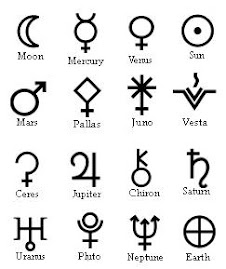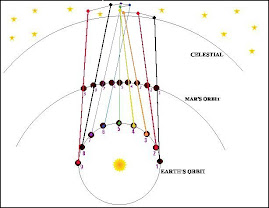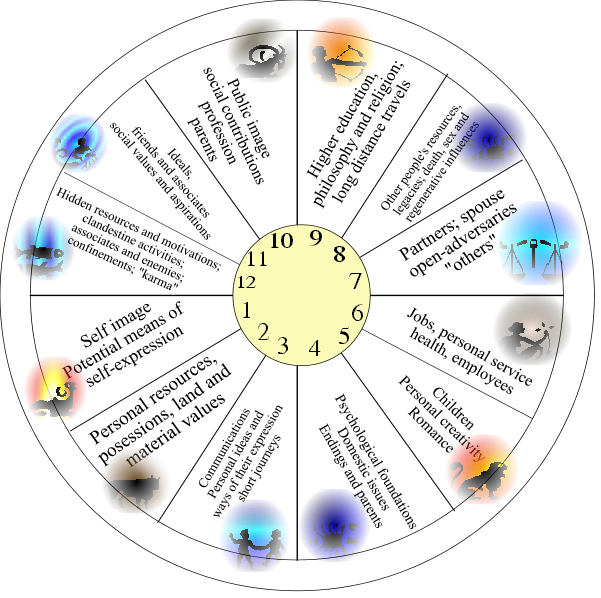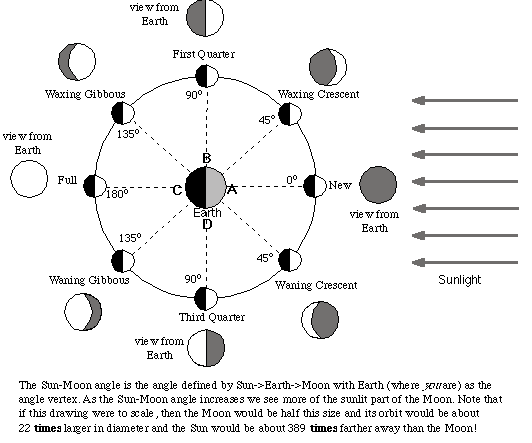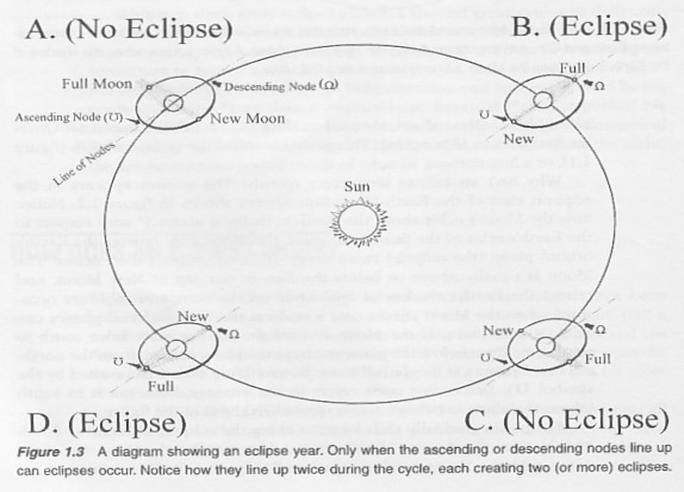Friday, March 6, 2009
The Solar System in Astrology
While astronomy deals primarily with the physical positions, dimensions, composition and motion of celestial bodies, astrology searches for the meaning in them by looking at them through the lens of symbolism. The existence of the Sun, Moon and the first five planets of the Solar System (i.e. Mercury, Mars, Venus, Jupiter, Saturn) is known to ancient man before the invention of the telescope. To the astrologer each planet represents more than just a celestial body. Rather it has a core symbolism which carries multiple layers of meanings derived from the core principle.
The Luminaries - Sun, Moon
Since ancient times, the Sun has been viewed with awe. Its shining light provides the life force and vitality necessary for growth and activity of all living things. When it sets, the mystical Moon takes over and shows the reflected light from the Sun. Together, these two bodies are known as the Luminaries.
The Sun and the Moon are polar opposites in astrology. They represent the psychological male-female principle in us. They are also associated with the harmonious balance of emotions in our psychological environment. This is classically known as the Yin-Yang principle in Chinese metaphysics. Their relationship to each other varies constantly with the Lunar Cycle and is important in shaping our core personalities.
The Personal Planets - Mercury, Venus, Mars
The first three planets of the Solar System (i.e. Mercury, Venus, Mars) are known as the personal planets in astrology. This is partly because their symbolism pertain to fundamental human urges. The first planet, Mercury, represents our urge to make connections. It carries the name of a Roman god who is the equivalent of the Greek Hermes. In fact the Greeks regard both the planets and their respective gods as psychological entities. Hermes is a multi-talented deity who is witty, clever with language and his hands and with travel. He moves freely between the living and the underworld and is known for his role as a messenger. Hence Mercury has come to symbolize mental activity, intelligence, communication and craftsmanship.
The second planet, Venus symbolizes the urge to make relationships. It is associated with two Greek goddesses, Aphrodite and Athena. Aphrodite is a symbol of beauty, love, sensuality and luxury. Athena on the other hand, is associated with peace, harmony, balance, wisdom and appreciation of artistic values. In the birth chart, the position of the planet Venus tells us about the individual's romantic inclinations and artistic talents.
Mars is a warrior god. The Romans honoured his spirit of courage, strength, sportsmanship and military discipline. In the natal chart it represents the nature of one's driving force, fighting spirit, assertion and anger. It tells us how easy or how difficult one shows up his anger and his manner of managing conflict.
The Social Planets - Jupiter, Saturn
Jupiter and Saturn ar known as the social or interpersonal planets because they are perceived to link us with our larger society and concepts beyond our individual confines. Being the largest planet of the Solar System, Jupiter's symbolism has been passed down as abundance, excess, optimism and good luck. In the birth chat, it tells us the urge of the individual to broaden his horizons and how he develops his philosophical and religious beliefs. If well placed in the chart, it can represent a positive outlook in life and an ability to take advantage of opportunities.
Saturn, by virtue of the fact that it is the outermost planet visible to the naked eye, has come to be associated with boundaries, limitations, restriction and death. The Saturn archetype is traditionally considered as negative, undesirable or evil. Its position in the natal chart often denotes the principle of fear and a perception o9f where one may fail in his life.
The Outer Planets - Uranus, Neptune, Pluto
Discovered only after the invention of the telescope in the 16th century, the outer planets (i.e. Uranus, Neptune and Pluto) have come to be associated with Modern Astrology. They are also known as the transpersonal or generational planets. Because of their wide orbits they take many years to move through each of the zodiac signs. Uranus stays for about 7 years in a sign, Neptune 14 years and Pluto about 20 years. Hence, in a natal chart, the sign the outer planets occupy is more descriptive of generational rather than personal issues. On the other hand, the houses they occupy would ground them on more personal issues.
At a personal level, Uranus indicates the impulsiveness, detachment and the area of life in which the individual may be eccentric. Neptune is involved with the individual's urge for sacrifice and redemption. Pluto, on the other hand is indicative of hidden power, change and transformation. These three planets have a strong role in the symbolism surroudning one's midlife crisis.
Thursday, February 19, 2009
Psychological Perspectives in Astrology
The philosophical premise upon which Psychological Astrology is based is that the individual's reality springs outward from his inner landscape of thoughts, feelings, expectations and beliefs. For instance, in astrological symbolism Saturns represents limitation, restriction and boundaries, whereas the 11th house represents the person's friends, peers and community in his everyday life.
If we take the example of a university student whose natal Saturn is in the 11th house of his birth chart, he is likely to show up as a problem of having trouble with his friends and study mates in his campus life. Yet, in terms of Psychological Astrology, that interpretation may represent just the tip of the iceberg.
Conflict with friends is only an outer manifestation of something which the student himself is responsible for creating. His relationship difficulties with his study companions is the surface manifestation of something much deeper. The deeper psychological issue is probably a fear of expanding his boundaries to include something other than himself. There is likely to be an internal conflict. He may want to become greater individual than what he already is, and yet he is afraid of endangering the identity that he already possesses. Any planet placed in the 11th house in his birth chart will urge him to encompass a greater reality, but his Saturn, being restrictive in archetype, will hold him back mentally and caution him to preserve what he is already familiar or comfortable with.
The student now understands that it is not lousy friendship that is restricting his development. Rather it is his own restrictions which limit his friendship. He then obtains a better insight into his own inner psyche. Rather than telling him "Sorry, your friends are no good", the astrological chart now opens up his growth potential. He now understands that what he sees in life is coloured by what he expects to see. He may then appreciate that difficulties with friends is but a necessary and productive phase of his campus experience, and it would benefit him to grow side by side with his constant challenge of making friends.
In carrying the astrological interpretation further, a knowledge of the sign placement of Saturn often provides useful insight as to why the student might experience difficulty. For instance, the student with the Saturn in Aries in 11th house may experience difficulty in making friends because he is unable to assert himself in a group situation. A Saturn in Taurus may shy away from socialising with friends simply because he is financially thrifty. A Saturn in Gemini suggests that the difficulty may lie with the way he communicates with others. A Saturn in Cancer may find socialising with friends burdens his responsiblities to his family. On the other hand a Saturn in Leo may annoy his peers too much because he does not want to play "second fiddle" to anyone else. For a Virgoan Saturn, his group mates may find him too serious and worrisome with regards to small matters.
Sometimes, a Saturn in Libra may provide us with the clue that the student harbours an inferiority complex that limits his interaction with people. The student with Saturn in Scorpio may be too demanding of others in terms of responsiblity and overwhelms his groups mates who do not want to carry their share of the load. The student with Saturn in Sagittarius may clash with his friends in terms of religious or philosophical differences. The student with Saturn in Capricorn mistrusts others' ability to live up to his standards and therefore unable to delegate responsibilities during group work. The student with Saturn in Uranus may strike his group mates as being too offbeat and unconventional in his ideas whereas the student with Saturn in Pisces may be too sensitive, too paranoid and too gloomy to attract his friends' company.
Sunday, February 15, 2009
The Saturn Archetype

Saturday, February 14, 2009
The Mars Archetype

The Roman Mars and the Greek Ares were the gods of war but perceived very differently in their respective cultures. Originally Mars was a vegatation or fertility god because the Italian economy was based on agriculture. Some believe that this foreceful god was so important to the Romans because the people may have had to fight to maintain their fields and plantations. As the Roman Empire grew, Mars evolved into the magnificient brave conqueror. Ares on the other hand, was not appreciated by the intellectual Greeks. Rather he was often portrayed as the coward and the laughing stock of the gods.
The archetype of Mars has much to do with our assertion and aggression. It is the force within that helps us to get our way, stand up for our rights and become self-directing. Mars is necessary to keep us from being pushed around. It is the power that helps us stand up on our two feet and get what we want, say what we feel, and actualize our will.
Too much Mars energy however, makes us arrogant, overbearing and contemptuous. We push others around, demand they bend to our will and ignore their rights. We become the tyrannical boss and the oppressive spouse. Too much Mars may also mean that we dominate and are ready to crack down on everything and anything.
In a healthy body, Mars represents the vigor and vitality of movement, and especially the muscles. But it can also manifest as irritations, inflammations, infections and fevers. Mars can be one of the principal significators of operations nd accidents.
Mars in the Natal Horoscope
In the natal chart where Mars is placed by sign and house it indicates how best we can express our will in life and how to go about getting what we want. Strong placements of Mars can indicate an aptitude for competitive sports, physical and athletic challenges, positions of command, including the military and other occupations that require bravery and assertive power. Mars is not a natural team player unless it leads the pack. A strong Mars placement in the chart denote a competitive, athletic, risk-taking personality. Any vacation that that results in scarring and wounding, such as soldiers, martial artists, race-car drivers, people who deal in guns and knives generally will have strong influences in their natal charts. Mars in the birth chart challenges you to become a master strategiest in whatever house you find it in and whichever house it rules. It is the area of the chart that you cultivate the environment for greatest success.
The Mars personality type is an individualist. Mars people do not want to compromise their own integrity by following a path set by another. They are the type who often is the first to go where none have gone before. The true Mars type wants to be left alone, free to pursue whatever path is desired. For this reason, the Mars type may have difficulty in relationships, especially work relationships. In love relationships, the Mars type needs a partner who is an independent equal, capable of going his or her own way when necessary.
Mars in the Corporate Horoscope
In corporate and business charts one should look at the meaning of Mars differently and use the symbolism of Mars in its purest forms. Since Mars represents assertion and aggression, we look at Mars in business delineation as the key planet signaling whatever that motivates a company to thrive and prosper. For the individual, Mars shows us why we get out of bed every day and go to work. Likewise for an organisation, it shows why a company keeps doing or not doing what it needs to do to be a success. In business astrology, the planet Mars is seen as the "buying barometer". If you are interested you take a risk and you have to take action.
The location of Mars in your company's chart is where you are asked to be courageous, to get up when you fall, and to not react when things are not responding to your appeals. The paradox of Mars in this area of the chart is where your company have to struggle and is challenged to be tactical and strategic. It is where at any turn, the organisation can be wounded and suffer losses, but still must continue inorder to achieve and trail blaze new areas in the house that Mars is placed or rules. The location you find Mars in your company horoscope is where you struggle, have to stop and re-group, but on the cutting edge, and exhibit bravery in the face of market competition.
Mars in the National Horoscope
Mars is the planet of war, of soldiers, agitators, rebels, violent criminals and all those who dispute and contend. It is the planet of desire and aversion. In a national chart, Mars represents the forces that hold a State together or drive it apart in terms of aggression. The threat of war is often the means by which a country becomes united. At an archetypal level, Mars represents the collective need of a nation to have an army to fight against enemeies, or to express itself aggressively. It can also show what helps a country to grow, to assert itself and act decisively to prevent internal violence, riots or rebellions.




